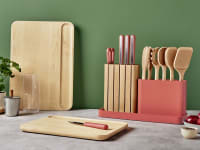HexClad Japanese Damascus Steel Knife Set Review
This Gordon Ramsay-approved knife set isn't designed for every chef
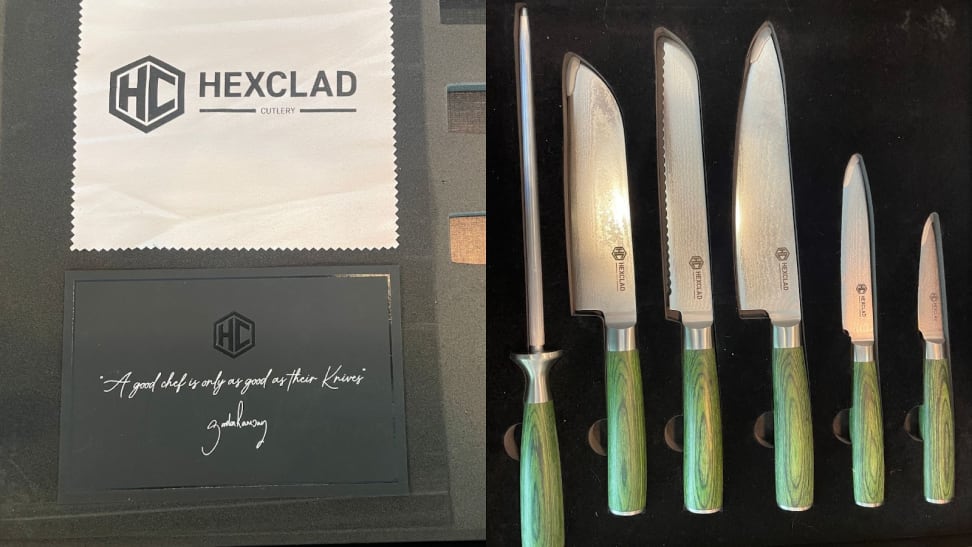 Credit:
Reviewed / Jenny Dorsey
Credit:
Reviewed / Jenny Dorsey
Products are chosen independently by our editors. Purchases made through our links may earn us a commission.
-
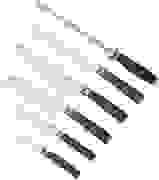
HexClad Essential 6-piece Japanese Damascus Steel Knife Set
Pros
-
Sharp blades
-
Durable construction
-
Versatile sizes
-
Ready out of the box
Cons
-
Uncomfortable in hands
-
No sheaths
-
Not dishwasher safe
-
In the kitchen, knives are the unsung heroes. A good knife set is the difference between a miserable meal prep or an easy, breezy one. Whether you're a pro or a home cook, quality knives are tools worth investing in—which is why we're always on the hunt for the best on the market.
The HexClad Essential 6-piece Japanese Damascus Steel Knife Set (available at Amazon) comes from the Gordon Ramsay-approved brand that's known for its hybrid cookware. While this knife set is undeniably sharp and offers practical knife sizes, it falls short in terms of the attention-to-detail and a lack of ergonomic comfort.
About the HexClad Essential 6-piece Japanese Damascus Steel Knife Set
HexClad is a well-known name in the realm of kitchenware, and this Essential 6-piece Japanese Damascus Steel Knife Set is its first product foray into cutlery.
Damascus steel, or “damasked steel,” dates back to before the industrial era; its creation originates from the Middle East, with metalsmiths forging blades using special wootz steel imported from India. It can be recognized by its distinctive wavy pattern and exceptional hardness, with sharp, strong, and durable blades.
In this set, the Damascus steel is also complemented by green pakkawood, an engineered wood and plastic composite often used for fanciful knife visuals.
The 6-piece knife set includes five blades and a honing steel, each suited to a particular set of culinary tasks.
The 8-inch chef's knife is the most versatile, for a wide array of slicing and chopping needs; the smaller, 5-inch utility knife slots in where a boning knife or flexi-knife may otherwise be used; the 7-inch santoku offers a more compact size for more precise kitchen projects; the serrated knife is ideal for slicing through bread; and the 3.5-inch paring knife is best for tasks like peeling and trimming.
Retailing for $350, the HexClad Japanese Damascus Steel Knife Set provides an accessible entry point to the world of Damascus steel knives with a wide range of knife sizes.
How we tested the HexClad Essential 6-piece Japanese Damascus Steel Knife Set
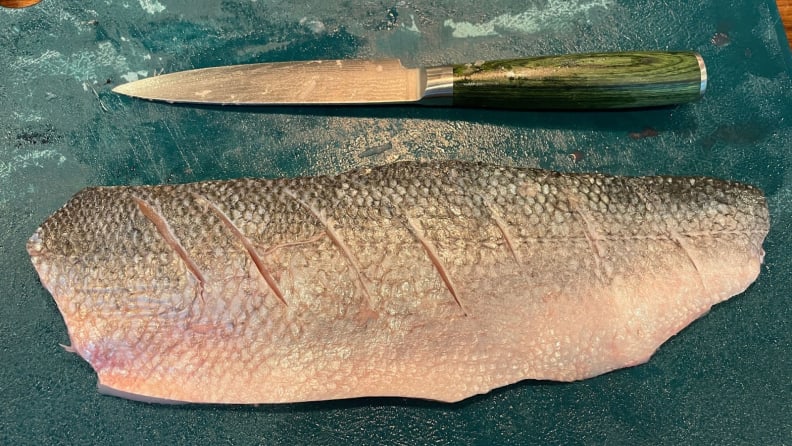
The 5” utility knife from the HexClad set is well-suited to filleting fish.
We tested the HexClad knife set using a comprehensive range of kitchen tasks, including filleting a whole branzino, dicing ripe tomatoes, cubing butternut squash, slicing bread, mincing garlic, and deveining shrimp.
We conducted these tests immediately upon unboxing, without any initial honing on the steel, to gauge the knives’ out-of-the-box readiness for use. Later on, we examined the effectiveness of the included honing steel to realign the used knives’ blade edges.
What we like
Knives are sharp and ready to be used out of the box
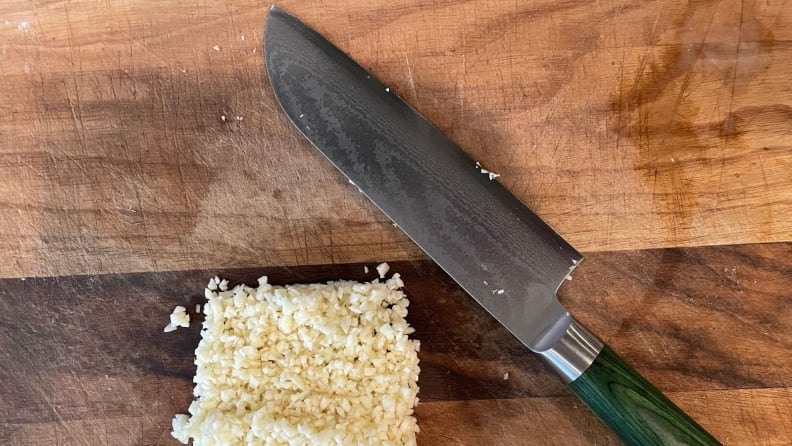
The santoku can be used for kitchen projects like mincing garlic.
All the knives were delightfully sharp and ready for kitchen use straight out of the box without further sharpening.
During our tests, the knives effortlessly sliced through various ingredients. Through every task we threw at—like breaking down a whole branzino, slicing through crusty sourdough, and deveining shell-on shrimp—the knives consistently demonstrated their ability to excel in a diverse range of culinary scenarios.
HexClad explains that each knife is “forged from 67 layers of Japanese Damascus steel” to give a harder blade that scores 60 on the Rockwell Rating, a standard hardness test for metals. (There are many types of Rockwell tests; for kitchen knives, it is commonly the HRC or Rockwell C Scale that is used. It measures a metal’s resistance to indentation under a fixed amount of force—the smaller the indentation, the higher the score.)
This would be considered a premium, harder steel. So it requires less frequent sharpening than softer counterparts, but it can be more difficult to maintain. In comparison, brands like Zwilling, J.A. Henckels, and Wüsthof offer knives with an HRC of roughly 55 that are easier to sharpen.
The knife sizes are comprehensive for a spectrum of kitchen uses
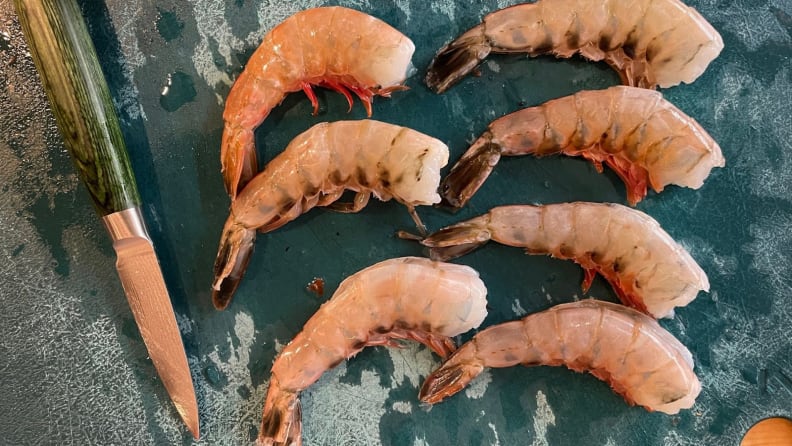
The utility knife can be used to devein shell-on shrimp.
The HexClad set truly shined in its thoughtful selection of knife sizes. Too often, knife sets contain throwaway (or utterly uselessly sized) knives that are added to bolster consumers’ value perception of the overall set.
Here, every knife can be put to good use: The chef’s knife is the standard workhorse for chopping, slicing, and dicing. The utility knife is a surprisingly good substitute for a flexi-knife (a thin, bendy knife used for filleting fish) as well as a carving knife (a curved knife with a sturdier base used to maneuver around meat cuts with bones). The paring knife is small and fine-tipped enough for delicate processes like peeling an apple or slicing decorative lemon wheels.
The serrated knife worked well for its classic use of breads with both soft and hard crusts, but performed less well on ingredients like very ripe tomatoes. Luckily, the other knives in the set are sharp enough that it’s unnecessary to use the serrated knife for that function.
The santoku, usually my preferred silhouette, was the only knife that didn’t feel as differentiated as it could have been. It’s typically meant to be thinner and lighter than a chef’s knife, used for more precise and refined kitchen tasks (think super-thin cucumber slices). This version felt too similar to the existing chef’s knife and also didn’t have the Granton edge (small divots on the edge of the blade to prevent food sticking), making it rather duplicative for the set.
The knives are thin enough for precision cuts
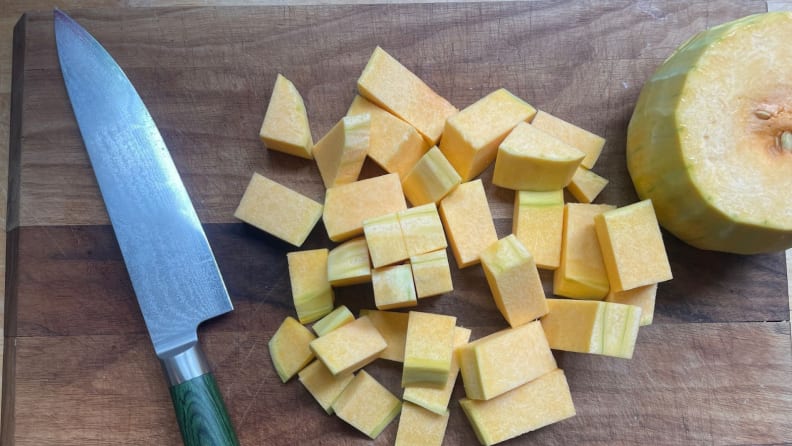
The chef’s knife is well suited for cubing hardy vegetables like butternut squash.
In line with expectations of Japanese steel, these knives are thin enough for more precise work like a fine brunoise (first julienned, then diced into small cubes).
A long-time complaint of mine with knives from brands like Wüsthof—my first set included in culinary school tuition and quickly discarded soon afterward—were incredibly thick spines. These would unnecessarily tire my hands after long hours in the kitchen and elongate the time needed to execute more presentation-focused tasks like teeny-tiny watermelon cubes or paper-thin strips of potato.
This HexClad set avoids that problem, with thin builds that are lightweight and easy to maneuver.
The honing steel works well
The honing steel proved to be a reliable companion in maintaining the knives’ blades over time.
Comfortable to handle, it executes its intended function of realigning the knife edges after several uses. This straightforward yet effective tool contributes to the set’s overall usability and removes the need for users to buy a separate honing steel.
(That said, I personally still prefer to use a diamond steel for honing and sharpening in-between sharpening sessions on the whetstone.)
What we don’t like
Knife handles are uncomfortably long, thick, and bulky
These knives are certainly made with larger hands in mind. It was immediately apparent out of the box that these knives are bulky. In addition to the handles extending longer than anticipated, they are large and uncomfortably round.
Unlike the flat, light, almost dainty profile of my favorite Japanese knife handles, these thick, round handles were hefty and annoying to hold; the long handle protruded into my wrist and made it difficult to maneuver deftly.
While the knives’ full-tang construction is a plus (meaning the blade extends all the way to the end of the handle), in this case, it also adds to the overall weight of an already-dense handle, throwing off its balance.
This means that these knives are likely better suited for larger hands. This was a disappointing detail for folks like me, in particular.
Women in the food industry already face the continued effects of professional kitchens built to favor men, and this knife design echoed a similar bias. This was made especially evident through the knife set's collaboration with Chef Ramsay, who has made publicly sexist comments about female chefs in the past and has been embroiled in similar controversies through his career.
No sheaths included
Even at a fairly steep price point, there is not a single sheath included for any of the knives in this set. Instead, tiny plastic tip protectors are used to keep the knives from jutting into the soft foam insides of its box.
It's unclear if the assumption is that buyers of these knives would already have sheaths at the ready, to be used if carrying in a knife roll to work. But the tip protectors of each knife pose more of a danger to the user who needs to remove them to use the knife than any real protection—especially when the knives are already form-fittingly packaged in the box.
Not dishwasher-safe
No premium knife makers will recommend dishwashing machines for their knives, as the high temperature and moisture of a dishwasher can easily damage the knife. And this HexClad set is no exception.
For those insistent on washing knives in the dishwasher, opt for more entry-level knives like Victorinox.
What other people are saying
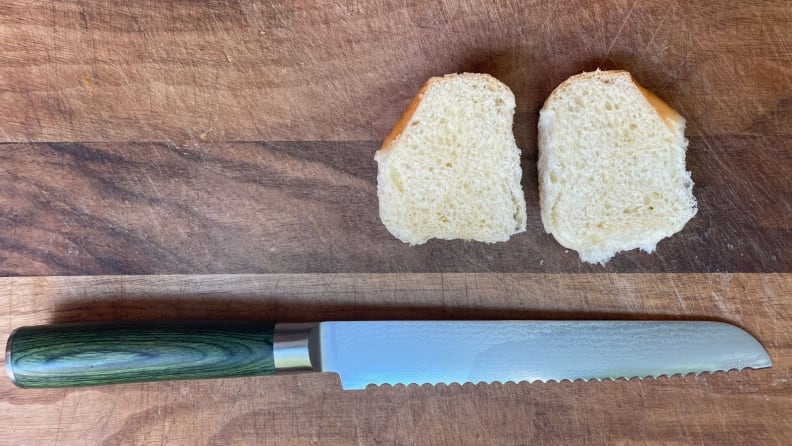
The serrated knife slices cleanly through soft breads like brioche.
The HexClad Essential 6-piece Japanese Damascus Steel Knife Set has garnered an overall positive rating of 4.5 stars from combined reviews on the HexClad, Amazon, and Walmart websites.
Enthusiastic reviewers have lauded the knives for their sharpness and practical sizes, which accommodate a wide range of kitchen tasks, along with their elegant packaging.
However, critical feedback has surfaced regarding the knives’ tendency to rust quickly upon initial use, causing concern among users.
Additionally, individuals with smaller hands have noted that the knives’ handles are heavy and cumbersome.
Notably, those who encountered accidental chipping or other knife-related issues expressed dissatisfaction with the limitations of the HexClad warranty, which appears to exclude certain problems.
Should you buy the HexClad Essential 6-piece Japanese Damascus Steel Knife Set?
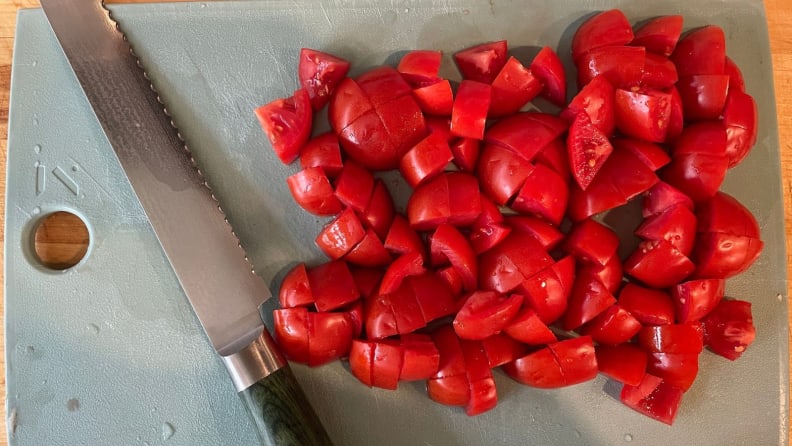
The serrated knife being used for slicing thin-skinned ingredients like tomatoes, although the chef’s knife or santoku may be preferable.
Yes, if you have larger hands and are looking for a complete knife set
For individuals seeking a set of sharp and durable knives, the HexClad Essential 6-piece Japanese Damascus Steel Knife Set is a compelling choice. These knives arrive remarkably sharp right out of the box, handling a large range of culinary tasks with finesse.
However, it's essential to note that these knives are not for everyone; they're tailored for folks with larger hands. The handles are thick, round, and bulky, not suited for comfort and maneuverability, especially during extended kitchen use. I always recommend serious knife buyers consider testing knives in-store to find brands well-suited for their goals and align with their comfort preferences.
At $350, this is also a well-priced knife set for those looking to upgrade from mass-market brands. However, with better-constructed knives also comes the responsibility of washing the knives by hand, as well as consistently honing (on a steel) and sharpening (on a whetstone) the knives to keep the blade edge aligned and sharp. Be prepared to take care of these knives so they last as long as possible!
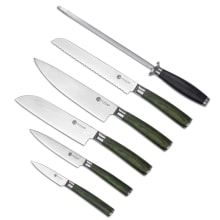
You don’t have to sacrifice functionality for design with Hexclad’s Damascus 6-piece steel knife set.



